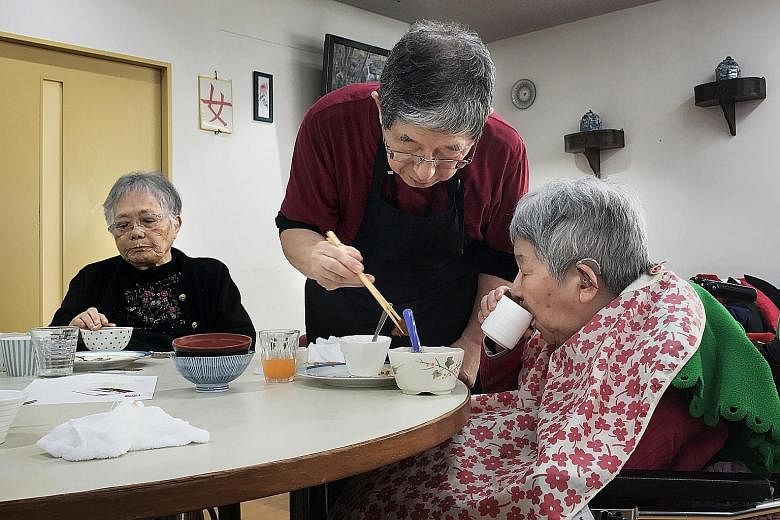YOKOHAMA (Japan) • It is lunch hour at the Cross Heart nursing home, and a 72-year-old, slightly stooped man is spooning soup and filling teacups.
But Mr Kunio Odaira is not one of the residents. He is one of the staff, part of an increasingly grey workforce in an increasingly grey country. "I enjoy talking to the people here. It's fun, but it's also hard work," Mr Odaira said during a break from his caregiving duties.
Japan is considered a "super-ageing" society. More than a quarter of the population are over 65, a figure set to rise to 40 per cent by 2050. The average life expectancy is 85, and that means many people remain relatively healthy for a good two decades after the retirement age.
At the same time, the birth rate has plummeted to well below the level needed to keep the population stable. Now home to 128 million people, Japan's population is expected to number fewer than 100 million by 2050, according to government projections.
That means the authorities need to think not only about ways to keep seniors healthy and active for longer, but also about how to augment the workforce to cope with labour shortages.
Enter the septuagenarian caregiver. At Cross Heart, more than half of the 119 caregivers are over 60, and 15 of them are over 70.
"When we advertise for people to work here, we get lots of responses from older people, not younger people," said nursing home director Kaori Yokoo in the lobby where residents were doing leg curls and chest presses on weight machines.
The foundation that runs this nursing home and others in Kanagawa prefecture has raised the official retirement age to 70, but allows employees to keep working until 80 if they want to and can.
Meanwhile, researchers are working on robots that can lift the elderly out of beds and wheelchairs, and inward-looking Japan is slowly coming around to the idea that it may need to allow in more foreign workers.
Although older workers have constraints - some cannot do the heavier tasks - they also offer advantages over younger workers who want time off for their children, said Ms Yokoo, who is 41. "Plus, because they're close in age to the residents, they can relate to each other more," she said. "We younger people think this must be nice for them. Older staff can understand things like physical pain more because they are living through the same things."
Some of the older workers here are doing it because they need the money. For others, the money is a nice benefit, but the main motivation is the activity and sense of community.
Ms Kiyoko Tsuboi, a 95-year-old who is at the rest home during the day, said she likes having Mr Odaira around. "He's very attentive to our needs and knows things like how hot we like our tea. My son is not as kind as Odaira-san," Ms Tsuboi said as Mr Odaira cleared away the lunch dishes.
The dynamic works well for Mr Odaira too, who started here 17 years ago after retiring from his job in the sales department of an auto parts maker. He works eight hours a day, four days a week.
His father died when he was a child, his mother when he was 22. "It's not like I'm replacing my mother, but I thought I could help someone else's parents," he said.
Ms Hiroko Akiyama, at the University of Tokyo's Institute of Gerontology, said a 65-year-old Japanese now is in much better physical and mental shape than his counterpart a few decades ago. "They are full of energy, healthy and long-living," she said.
Ms Akiyama's research has found that working helps keep seniors that way. "They operate on a regular schedule. They wake up, get ready, go to work, talk to people and stay connected," she said.
Mr Odaira said he works to stay young. "I think it's good for me physically and mentally. So, as long as I can keep working, I will."
WASHINGTON POST

